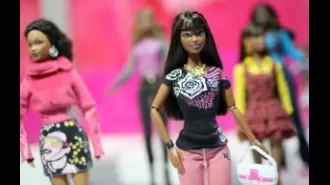I lost my dream job after disclosing my disability.
The email said they didn't think I would fit in with the team because I was 'different.'
April 27th 2024.

When I walked out of the job interview, I was filled with joy and excitement. It was my first step towards a career in law, something that I had worked hard for all my life. The employer had even shook my hand, winked, and told me, “I expect we shall see each other again very soon.” It was a promising start to my legal journey.
The email came a few days later, with the subject line reading, “Congratulations!” Attached to it were diversity and inclusion forms for employees. I quickly filled out the forms, indicating that I identified as disabled and needed reasonable adjustments. I didn’t think much of it at the time and sent it back.
But then, I received a phone call from the interviewer, asking about my disability. After a long pause, the tone of the conversation changed. I was happy to explain the adjustments I needed, such as access to an accessible bathroom, permission to carry sharps, and flexibility for medical appointments. But the tone on the other end of the line had shifted, becoming rushed and monotone.
Later that day, I received an email stating that they had chosen another candidate for the job. They believed that I wouldn’t fit in with the team dynamic because I was “different”. They also mentioned that they weren’t able to offer any adjustments for my disability. I was confused. Why did they send me the forms if they weren’t willing to follow through with the adjustments? Was it just a tick-box exercise? Did they only accommodate less severe health complications?
Sadly, this is a common experience for disabled people in the workforce. I’ve faced similar situations more than once, and after talking to my disabled friends, I know I’m not alone. It’s a reality that many of us have to deal with – being overlooked and discriminated against because of our disabilities.
I was born with Loeys-Dietz Syndrome, a genetic condition that affects my body’s connective tissue and has multiple life-threatening complications. This means that every part of my body is weak, undeveloped, or failing. There is no cure, and I’ve had to deal with various disabilities such as gastroparesis, multiple organ failure, POTS, heart failures, and immobility. Despite these challenges, I am still a person with capabilities and talents, just like everyone else. I may have to do things differently, but that doesn’t mean I’m any less capable.
Unfortunately, my experience with this employer is not unique. I’ve been humiliated and ostracized at work because of my disability. I’ve been told that I don’t belong with the team and that I’m only there to fulfill a diversity quota. I’ve even been given menial tasks because they didn’t believe I could keep up with everyone else.
Tired of facing barriers and discrimination in the workforce, I made the decision to leave formal employment and work for myself. It was a risk, but I was tired of feeling undervalued and mistreated. I decided to champion the removal of discrimination wherever I could.
Now, I am a multi-award-winning campaigner, lobbyist, investor, and policy designer. I work closely with organizations, charities, and governments to advocate for improved equity, inclusivity, accessibility, and opportunities for disabled people. I am also the co-founder of The Disability Policy Centre and Access2Funding, which focuses on putting disability at the heart of Westminster and transforming opportunities for disabled entrepreneurs.
I am incredibly proud of the work I’ve done to help shape the world for disabled people. However, the barriers for disabled people in employment are still prevalent. We are often misunderstood and seen as risky instead of talented. Our capabilities are judged based on our health, rather than our skills. On top of that, accessibility barriers – both virtual and physical – are still rampant, and stereotypes about disabled people continue to persist.
But disabled people are not just a marginalized group – we are also a powerful economic force. Over 25% of small businesses in the UK are owned by someone with a disability or health condition, and the spending power of disabled people and their households is estimated to be worth £274 billion per year. Despite this, disabled people are almost twice as likely to be unemployed as non-disabled people, creating a 29% employment gap.
The responsibility to eradicate ableism and improve outcomes for disabled people falls on all of us – as employees and employers. We must create an equal playing field and see disabled people as equal value, worth, talent, and ability as a person without a disability. We must also ensure that accessibility is a right, not a privilege.
This can be achieved through active intervention, promotion, and instillment. We must be proactive, not reactive, in creating opportunities for disabled people and eradicating ableism. We must foster environments where disabled people feel recognized and valued.
To the employer who turned me away because of my disability, I say this: disability does not equal less ability. Nobody should have to experience discrimination based on any aspect of their identity. It’s time to end misconceptions, stereotyping, and stigma towards disabled people. We must all work towards creating a more inclusive and accessible world for everyone.
The email came a few days later, with the subject line reading, “Congratulations!” Attached to it were diversity and inclusion forms for employees. I quickly filled out the forms, indicating that I identified as disabled and needed reasonable adjustments. I didn’t think much of it at the time and sent it back.
But then, I received a phone call from the interviewer, asking about my disability. After a long pause, the tone of the conversation changed. I was happy to explain the adjustments I needed, such as access to an accessible bathroom, permission to carry sharps, and flexibility for medical appointments. But the tone on the other end of the line had shifted, becoming rushed and monotone.
Later that day, I received an email stating that they had chosen another candidate for the job. They believed that I wouldn’t fit in with the team dynamic because I was “different”. They also mentioned that they weren’t able to offer any adjustments for my disability. I was confused. Why did they send me the forms if they weren’t willing to follow through with the adjustments? Was it just a tick-box exercise? Did they only accommodate less severe health complications?
Sadly, this is a common experience for disabled people in the workforce. I’ve faced similar situations more than once, and after talking to my disabled friends, I know I’m not alone. It’s a reality that many of us have to deal with – being overlooked and discriminated against because of our disabilities.
I was born with Loeys-Dietz Syndrome, a genetic condition that affects my body’s connective tissue and has multiple life-threatening complications. This means that every part of my body is weak, undeveloped, or failing. There is no cure, and I’ve had to deal with various disabilities such as gastroparesis, multiple organ failure, POTS, heart failures, and immobility. Despite these challenges, I am still a person with capabilities and talents, just like everyone else. I may have to do things differently, but that doesn’t mean I’m any less capable.
Unfortunately, my experience with this employer is not unique. I’ve been humiliated and ostracized at work because of my disability. I’ve been told that I don’t belong with the team and that I’m only there to fulfill a diversity quota. I’ve even been given menial tasks because they didn’t believe I could keep up with everyone else.
Tired of facing barriers and discrimination in the workforce, I made the decision to leave formal employment and work for myself. It was a risk, but I was tired of feeling undervalued and mistreated. I decided to champion the removal of discrimination wherever I could.
Now, I am a multi-award-winning campaigner, lobbyist, investor, and policy designer. I work closely with organizations, charities, and governments to advocate for improved equity, inclusivity, accessibility, and opportunities for disabled people. I am also the co-founder of The Disability Policy Centre and Access2Funding, which focuses on putting disability at the heart of Westminster and transforming opportunities for disabled entrepreneurs.
I am incredibly proud of the work I’ve done to help shape the world for disabled people. However, the barriers for disabled people in employment are still prevalent. We are often misunderstood and seen as risky instead of talented. Our capabilities are judged based on our health, rather than our skills. On top of that, accessibility barriers – both virtual and physical – are still rampant, and stereotypes about disabled people continue to persist.
But disabled people are not just a marginalized group – we are also a powerful economic force. Over 25% of small businesses in the UK are owned by someone with a disability or health condition, and the spending power of disabled people and their households is estimated to be worth £274 billion per year. Despite this, disabled people are almost twice as likely to be unemployed as non-disabled people, creating a 29% employment gap.
The responsibility to eradicate ableism and improve outcomes for disabled people falls on all of us – as employees and employers. We must create an equal playing field and see disabled people as equal value, worth, talent, and ability as a person without a disability. We must also ensure that accessibility is a right, not a privilege.
This can be achieved through active intervention, promotion, and instillment. We must be proactive, not reactive, in creating opportunities for disabled people and eradicating ableism. We must foster environments where disabled people feel recognized and valued.
To the employer who turned me away because of my disability, I say this: disability does not equal less ability. Nobody should have to experience discrimination based on any aspect of their identity. It’s time to end misconceptions, stereotyping, and stigma towards disabled people. We must all work towards creating a more inclusive and accessible world for everyone.
[This article has been trending online recently and has been generated with AI. Your feed is customized.]
[Generative AI is experimental.]
0
0
Submit Comment





